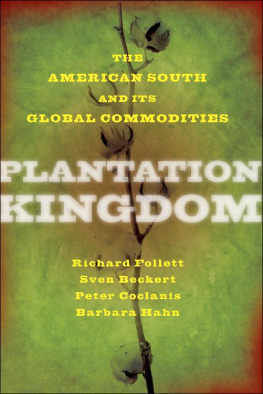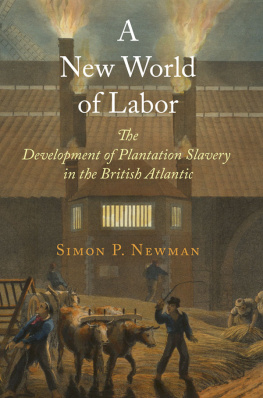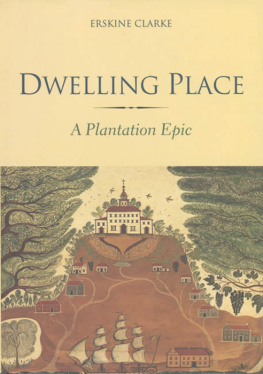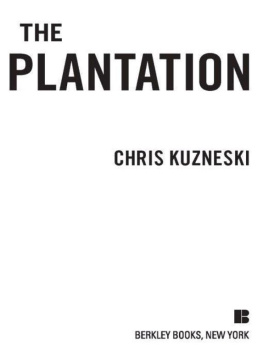Plantation Kingdom
The Marcus Cunliffe Lecture Series
RICHARD FOLLETT, SERIES EDITOR
Plantation Kingdom

The American South and Its Global Commodities

RICHARD FOLLETT
SVEN BECKERT
PETER COCLANIS
BARBARA HAHN


2016 Johns Hopkins University Press
All rights reserved. Published 2016
Printed in the United States of America on acid-free paper
2 4 6 8 9 7 5 3 1
Johns Hopkins University Press
2715 North Charles Street
Baltimore, Maryland 21218-4363
www.press.jhu.edu
Library of Congress Cataloging-in-Publication Data
Names: Follett, Richard, 1968 author. | Beckert, Sven, author. |
Coclanis, Peter, 1952 author. | Hahn, Barbara, 1967 author.
Title: Plantation kingdom : the American South and its global commodities /
by Richard Follett, Sven Beckert, Peter Coclanis, and Barbara Hahn.
Description: Baltimore : Johns Hopkins University Press, [2016] | Series: The
Marcus Cunliffe lecture series | Includes bibliographical references and index.
Identifiers: LCCN 2015026982| ISBN 9781421419398 (hardcover : alkaline paper)
| ISBN 9781421419404 (paperback : alkaline paper) | ISBN 9781421419411
(electronic) | ISBN 1421419394 (hardcover : alkaline paper) | ISBN
1421419408 (paperback : alkaline paper) | ISBN 1421419416 (electronic)
Subjects: LCSH: Southern StatesEconomic conditions. | PlantationsEconomic
aspectsSouthern StatesHistory. | AgricultureEconomic
aspectsSouthern StatesHistory. | Tobacco industrySouthern
StatesHistory. | Rice tradeSouthern StatesHistory. | Sugar
tradeSouthern StatesHistory. | Cotton tradeSouthern StatesHistory.
| SlaveryEconomic aspectsSouthern StatesHistory. | African
AmericansSouthern StatesEconomic conditions. | SlavesUnited
StatesSocial conditions.
Classification: LCC HC107.A13 F67 2016 | DDC 382/.410975dc23 LC record available at
http://lccn.loc.gov/2015026982
A catalog record for this book is available from the British Library.
Special discounts are available for bulk purchases of this book. For more information, please contact Special Sales at 410-516-6936 or .
Johns Hopkins University Press uses environmentally friendly book materials, including recycled text paper that is composed of at least 30 percent post-consumer waste, whenever possible.
CONTENTS

RICHARD FOLLETT

PETER A. COCLANIS

SVEN BECKERT

RICHARD FOLLETT

BARBARA HAHN

RICHARD FOLLETT
Plantation Kingdom
RICHARD FOLLETT
Introduction

COTTON IS KING , blasted South Carolinian James Henry Hammond on the floor of the US Senate in 1858. Who can doubt that cotton is supreme? the rambunctious Southerner declared. You dare not make war against it. By his estimates alone, the Souths four principal plantation cropscotton, rice, sugar, and tobaccogenerated wealth and exports that enriched the nation. He was right: the Southern states produced three-quarters of all cotton consumed by Britain, Europe, and the rest of the United States. With land aplenty, the finest soil, and the most delightful climate, Hammond asked whether the American South had territory enough to make an empire that shall rule the world. The great valley of the Mississippi, the South Carolinian announced, was the acknowledged seat of the Souths commercial empire, and its sway will be as great as ever the Nile knew in the earlier ages of mankind.
Hammonds empire unraveled in the bloody battle fields of the American Civil War. Confederate soldiers and generations of Americans, however, never forgot the centrality of export commodities to the Southern experience. Dixie, the unacknowledged anthem of the Confederate States of America, did not pull its punches. In the Land of Cotton, the famous ballad went, Old Times they are not forgotten. Old times were hard times too, for the Southern agricultural empire echoed to the sounds of whips, chains, and work bells. Almost
This book tells the story of the rise and the fall of Americas plantation kingdom. It explains how and why Americans began to cultivate the four great staple crops of Southern life; it considers the fundamentaldeterminativerole of enslaved and forced labor in the emergence, maintenance, and decline of Americas plantation staples, and it traces the efforts of rapacious entrepreneurs to reshape the Southern landscape in the name of profit and productivity. Readers keen to find cavaliers and moonlit dreams, however, will be sorely disappointed. In their place are the real Americans, free and unfree, who transformed the countryside and produced the raw materials from which much of the nations wealth derived. Land-hungry colonial Virginians take their place alongside hardscrabble farmers who uprooted trees and broke the sod on the cotton frontier. Shoulder to shoulder with these agricultural capitalists stand eighteenth-century tycoonswho amassed vast personal fortunes from rice landsand nineteenth-century sugar lords who stood atop Americas most industrialized, capital-intensive plantation regime. Although some were fabulously rich, these men and women were members of an aspiring farming and plantation class, and their chief motivations lay in wealth and power. Slavery, however, sharply distinguished the Old South from the rest of the countryracial bondage, not free market relations, dictated antebellum labor markets; labor-intensive production techniques endured; vast armies of enslaved workers toiled from sunup to sundown in work gangs; and the raw power that slaveholders exercised unleashed a violent, repressive world where planters wealth derived in no small measure from the sweated labor of their enslaved property. Slaveholders entertained no guilt over slavery. For them, racial slavery provided a steady, albeit sometimes refractory, workforce; it offered the only recognizable source of massed gang laborers for large-scale plantation agriculture, and slavery offered a tried and tested route to wealth accumulation.
No man is an island, however, and no kingdom lasts forever. As this short book makes clear, American farmers were thoroughly embedded in world export markets where competition proved fierce and where federal and state governments proved a valued, if sometimes fickle and occasionally disruptive, friend. By the eve of the First World War, when this book comes to a close, the once proud, indomitable plantation kingdom lay in tatters. American cotton no longer held sway in world cotton markets, US tobacco growers worked to the drumbeat of powerful Northern and transnational trusts, Carolinas rice fields dried up only to be replaced by golf courses and luxury condos in the 1950s, and the once rich sugar magnates of the Mississippi valley sold out or hung on for dear life, desperate for federal subsidies or tariff protection. Cotton growers in India spun thread more cheaply than any American farmer could manage, rice cultivators throughout Southeast Asia made Georgia and South Carolinas production irrelevant, European sugar beets and duty-free sugar cane knocked Americas domestic sugar cane industry sideways, and cheaper tobacco strains ensured that global competition burrowed its way into the heart of Kentuckys so-called Black Patch.
Next page












